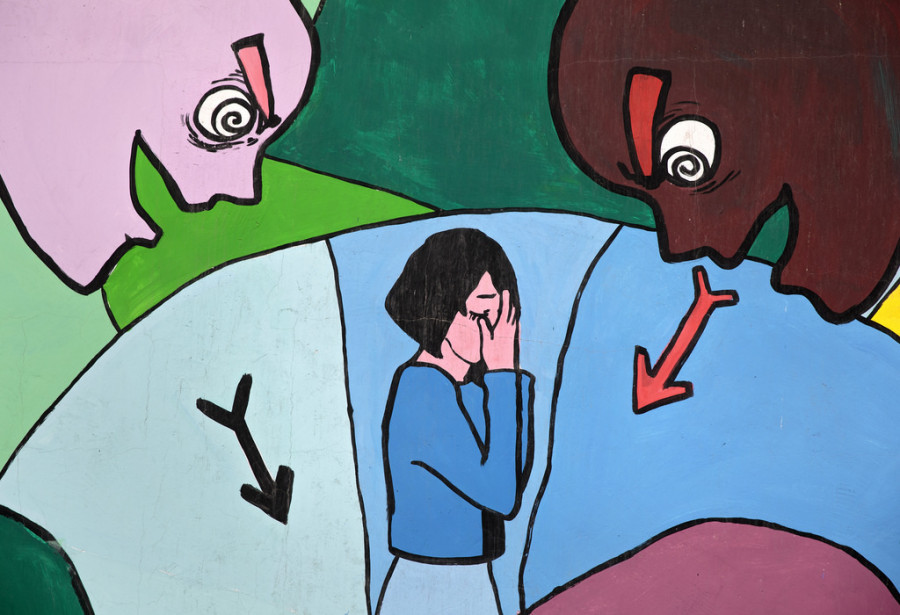National
Harassment, misogyny still all too common for women
The law has ensured women’s representation in the political sphere but attitudes have not changed.
Samiksha Baral
On February 28, Raghuji Panta, leader of the Pushpa Kamal Dahal-Madhav Kumar Nepal faction of Nepal Communist Party, made vitriolic comments against Komal Oli while addressing a party programme and his comments were followed by cheers and applause from the audience.
Komal Oli is a member of the National Assembly from the Prime Minister KP Sharma Oli faction of the party and a popular face of the Nepali music industry.
“The reason Oli has become a lawmaker and a Central Committee member is just because of singing the song ‘Poila Jana Pam’ (or ‘May I Get To Elope’) moving her saree up and showing her legs,” said Panta at the programme.
Panta made these invective comments while talking about how Oli was handpicked to be a parliamentarian ahead of other deserving women leaders from the party who have been serving for decades.
He said that the position Komal Oli holds is because of such activities.
Panta’s comment obviously did not go down well with Oli.
“Imagine where our society is heading when women are still targeted with such abusive attacks from a person who himself is a responsible leader of a political party. He was only endorsing a misogynistic attitude that prevails in Nepali society,” Oli told the Post a week after the incident. “People tend to think that the attack was only on Komal Oli, but remember this is an attack on all the women of the country and it will be repeated if the male-dominated society is not willing to accept that women can be leaders too.”
What happened to Oli was nothing new but representative of how Nepali male leaders and men in general treat women as subservient to them and objectify them, say observers.
“It is still a bitter truth that men have not accepted equality for women and tend to think that women do not have a place in political culture,” said Vijay Kanta Karna, a professor of political science at Tribhuvan University.
Although the country has taken a major stride towards ensuring women’s rights and representation, they are still treated as inferior and often made to believe that they are in positions only because men allow them to be.
According to Oli, if women are to be subjected to sexist remarks and sexual harassment, they will never come forward despite the government encouraging women representation by reservation system because of the fear of abuse.
“After this incident, I got many phone calls from my family and friends blaming me because I chose to go into politics from a music background and became a victim of such abusive comments,” said Oli. “This gives a strong message on how any violence targeted towards women has the effect of discouraging them from coming forward and being a part of something great.”
Following massive criticism from women’s rights activists and the members of the general public, Panta was quick to apologise. Oli had even threatened to take this issue to the court.
Even though the government has taken steps to increase women’s representation in legislative bodies by providing 33 percent of the parliamentary seats to women, harassment and male domination continues.
Komal Oli is not alone in her experience. Nor do such incidents take place only in Kathmandu—the capital city where most of the socio-political discourses take place.
Sushila Pakhrin gave all her life to local politics. Before being elected deputy mayor of Bahrabise Municipality in Sindhupalchok, Pakhrin had a three-decade-long experience of active politics.
In her 34 years of a political career, she has learned one thing.
“My work experience has taught me that when people have nothing to criticise about women leaders, they resort to character assassination. Women leaders are on the receiving end of verbal abuse and harassment,” Pakhrin told the Post from Sindhupalchok over the phone. “Being politically active comes with a price because in the end, it comes down to the character.”
Pakhrin says the state, over the years, has done a remarkable job in uplifting women from different parts of the country and bringing them into the decision-making process and in positions of power. But she admits that a lot needs to be done for giving a public platform to the country’s women.
“Giving women spaces just for the sake of constitutional provision but not doing anything to stop misogynistic behaviour towards them and excluding them from the decision-making process is shameful,” said Pakhrin.
The political changes in the country have been possible because women have fought for them.
“From 1950 to 2020 AD, in the duration of modern Nepal, women have played a central role, but the treatment towards women has not changed a bit,” said Karna. “From street protests to bringing in major socio-political changes in the country, women have made significant contributions.”
The contribution of women can be noted in the 1990 People’s Movement when women from all walks of life adhering to various ideologies and from different parts of Nepal actively participated in the movement to abolish the one-party Panchayat system and establish a multiparty democratic system.
Likewise, a significant number of women participated in the 2006 People’s Movement, contributing to the abolition of the monarchy and the declaration of Nepal as the federal democratic republic.
The federal republican constitution of 2015 ensured women’s representation in the political structure.
During the local election of 2017 women got their quota of 40.4 percent of nominations as well as the provision that either the mayor or deputy mayor has to be a woman as mandated by law.
The elections were held to elect 35,041 local representatives across 753 local units, including six metropolitan cities, 11 sub-metropolitan cities, 276 municipalities and 460 rural municipalities.
Though the local elections were a historic moment for gender inclusion, the candidacy and the elected representatives of men outnumbered women candidates.
Women were mostly elected for deputy positions—91 percent of them— with just 2 percent of women getting mayoral or chair positions in 753 local governments.
In 2015, Nepal elected Bidya Devi Bhandari as its first woman president. In 2016, three of Nepal’s top state positions—president, chief justice and Speaker of the House—were held by women.
But the presence of women at the top, even in a position as symbolic as that of the President, has not translated into similar successes for female leaders in other state organs. They are subjected to demeaning treatment by their male counterparts or other males.
A survey by the National Democratic Institute, 2016, stated that violence against women in politics was a worldwide problem.
In order to highlight violence against women in politics, the institute’s #NotTheCost initiative says that by attempting to exclude or silence women, it costs society the benefit of the resilient and responsive democratic governance that an inclusive political space can create.
“Women have to look after two domains—a public domain and a private domain—which is a double burden for them,” Manushi Yami Bhattarai, a Central Committee member of the Janata Samajbadi Party, told the Post. “As parliaments have been evolving constantly to make the country more equal and inclusive, women are still not heard. Most think that they have landed in positions just because of tokenism.”
According to a research conducted on Violence against Women in Politics by the Centre for Social Research and UN Women in 2014, more than 60 percent of women do not participate in politics due to fear of violence. The figure shows that violence against women has been one of the major barriers for women to take a step in politics.
“Although the percentage of women representatives has been increasing, people from racial/ethnic minorities, LGBTIQ groups and other marginalised groups have been more victimised and often go unnoticed or unheard in our country,” said Bhattarai. “Such violence aimed at women leaders is hierarchical in nature.”
The history of violence against women in politics is not entirely a new phenomenon in Nepal. While voicing their political opinion, many women have been subjected to hate speech and abuses.
In July 2020, Sarita Giri was expelled from the Janata Samajbadi Party and as a Member of Parliament just because of her dissent. Giri had opposed the government’s constitutional amendment bill to update the map on the country’s national emblem.
When Giri was the lone voice in opposition, going against her party whip to register an amendment that said that Nepal had no ground to press its claims to Lipulekh, Limpiyadhura and Kalapani, she was bombarded with hate speech inside and outside Parliament, and got subsequently expelled from the party.
More recently, last month, Ramkumari Jhakri, a leader of the Nepal Communist Party, had to face a similar outrage, including abuses on social media, for her speech made against the President. Later, she was even arrested for her remarks made during her speech in Gorkha.
Although she was later released following widespread criticism, it showed how the state was eager to curb free expression of women.
“Women today want nothing more but the right to have equal political spaces,” said Karna. “But sadly, the constitution has been written by men who still control the majority of the voices and those in power are not willing to cooperate.”
According to Karna, it has become more common for women to get sexist remarks with the newer arenas created by social media. Therefore, it is important to have strictly enforced laws on gender equality and for women in politics.
Oli, for now, has decided not to drag the issue to the court.
“But this incident has made me realise that be it at home or Parliament, women have to fight a long battle to live like a man who has been privileged by birth and that women have to be tolerant in every step of life,” said Oli.




 22.65°C Kathmandu
22.65°C Kathmandu













